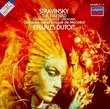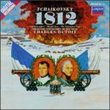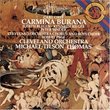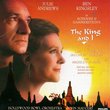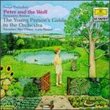| All Artists: Giacomo Puccini, Mirella Freni, Luciano Pavarotti, Nicola Rescigno, National Philharmonic, Sherrill Milnes, Richard van Allan, Wandsworth School Boys' Choir Title: Puccini: Tosca / Freni, Pavarotti, Milnes, Rescigno, National Philharmonic Members Wishing: 0 Total Copies: 2 Label: Decca Release Date: 10/25/1990 Genre: Classical Style: Opera & Classical Vocal Number of Discs: 2 SwapaCD Credits: 2 UPC: 028941403629 |
Search - Giacomo Puccini, Mirella Freni, Luciano Pavarotti :: Puccini: Tosca / Freni, Pavarotti, Milnes, Rescigno, National Philharmonic
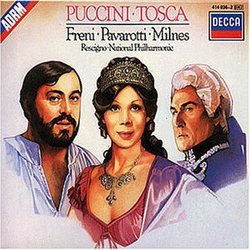 | Giacomo Puccini, Mirella Freni, Luciano Pavarotti Puccini: Tosca / Freni, Pavarotti, Milnes, Rescigno, National Philharmonic Genre: Classical
![header=[] body=[This CD is available to be requested as disc only.]](/images/attributes/disc.png?v=15401716) ![header=[] body=[This CD is available to be requested with the disc and back insert.]](/images/attributes/disc_back.png?v=15401716) ![header=[] body=[This CD is available to be requested with the disc and front insert.]](/images/attributes/disc_front.png?v=15401716) ![header=[] body=[This CD is available to be requested with the disc, front and back inserts.]](/images/attributes/disc_front_back.png?v=15401716) |
Larger Image |
CD DetailsSimilarly Requested CDs |
CD ReviewsToo Lyric For A True Dramatic Tosca Top Hat | 02/10/2006 (5 out of 5 stars) "If you're looking for a Tosca the way it should be performed and how it should really sound(fiery, passionate, dramatic) don't look to this recording. This should not be anyone's first Tosca recording or sampler!! I'm by no means a learned music or opera scholar but I am a critic and have listened and watched Tosca long enough to know that this particular recording was at the time purely experimental for Luciano Pavarotti and Mirella Freni. Yes, these two sing wonderfully together as well as individually. They are too many an unbeatable tenor/soprano pair, as their recordings of La Boheme, Manon Lescaut, Madame Butterfly and even L'Amico Fritz attest. While in these operas the music allows them to sing with full lyricism and beauty, the plot for Tosca is too dramatic, intense and forward-moving as an opera and the musical score itself reads this way. There are only a few moments of beautiful melodies: Cavaradossi's first aria "Ricondita Armonia" in which he rhapsodizes about his source of inspiration as an artist, his lover Tosca, the Love Duet between himself and Tosca that follows shortly after and Tosca's own heart-breaking aria "Vissi D'Arte", her prayer to God asking why he has abandoned her in her most needy hour when Scarpia has her in his trap and Cavaradossi is about to be executed. Puccini never fails to deliver some moments of beauty but for the most part, Tosca is an opera that depends on , raw human emotion and even violence, with just a touch of sexual undercurrent. For Sherill Milnes, the role of Scarpia was one that came easy to him. He had sung Scarpia splendidly on record earlier in 1973 for RCA with Leontyne Price and Placido Domingo. He starred as Scarpia in an Italian film with Placido Domingo and soprano Raina Kabaivanska shot on location in Rome in 1975. His baritonal technique is not only handsomely sung, but with the right amount of theatricality as a villainous character. Freni and Pavarotti had the same wet nurse in Italy and grew up together. Their long careers were remarkable. Both sang through the late 60's, the 70's, 80's and part of the 90's. In the Madame Butterfly recording under Karajan, their voices soar with beauty and emotion in the Love Duet and we get the same, if not more passion, in the Love Duet between Tosca and Mario in Act 1. Beautiful voices, yes. Dramatic enough ? Hardly. Mirella Freni is singing a role that is frankly too hard for her. There is more than one moment in which the role's vocal demands are too much for her to handle. Her Tosca is nonetheless very feminine, sensual and there are a few flashes of fire, but she portrays Tosca as if she were a quiet killer. Too much nobility, too much grace and Tosca is meant to be pushed to the brink of despair as she is completely threatened by Scarpia and even to act by her baser instincts. In this respect, in sheer beauty of tone, she is like Leontyne Price in the 1962 studio recording under Karajan. She makes a beautiful, ravishing Tosca, so if you like this approach, then you will enjoy Mirella Freni as Tosca. And word to the wise, this is her first Tosca recording and is far better than her later 1991 recording with Placido Domingo and Samuel Ramey. In that recording, she is past her prime and shouting instead of singing. It's the worst Tosca I've ever heard. As for Pavarotti in this recording, he is totally wrong for the part of Cavaradossi. Pavarotti is a voice made for Donizetti, Bellini and some Verdi. It's a voice that cannot step up to the challenge of the demands of the role of Cavaradossi, which calls for a darker more dramatic voice. When you hear the Cavaradossis of Mario Del Monaco, Giuseppe Di Stefano, Franco Corelli and Placido Domingo you are getting the real thing. But Pavarotti is just Pavarotti- a big, blazing, bright voice without any real intelligence or dramatic commitment. He fails miserably here, no matter what any Pavarotti fan might tell you. This is not a role for him. Even Calaf in Puccini's Turandot is a role suited for him, and Pinkerton in Butterfly, but not Mario Cavaradossi. Rescigno and the National Philharmonic are nothing to be excited about as far as musicality. Please, check out these recordings of Tosca for better quality in performance: Maria Callas, Giuseppe Di Stefano, Tito Gobbi/Serafin Renata Tebaldi, Mario Del Monaco, George London/Molinari-Pradelli Leontyne Price, Giuseppe Di Stefano, Giuseppe Taddei/Karajan Birgit Nilsson, Franco Corelli, Dietrich Fischer-Dieskau/Maazel Montserrat Caballe, Jose Carreras, Ingvar Wixell/Sir Colin Davis Leontyne Price, Placido Domingo, Sherill Milnes/Mehta Galina Vishnevskaya, Franco Bonisolli, Matteo Manuguerra/Mtripovich Katia Ricciarelli, Jose Carreras, Ruggero Raimondi/Karajan Carol Vaness, Giuseppe Giancomini, Giorgio Zancanaro/Muti Angela Gheorghiu, Roberto Alagna, Ruggero Raimondi/Pappano " Puccini sung by Frenin Milnes and Pavarotti? What could be Top Hat | Kansas City, MO | 05/12/2007 (5 out of 5 stars) "I own several recordings of Tosca, but this is still the reigning favorite, featuring a stellar cast at the height of their collective powers. Don't let the 1978 recording date deter you - the sound quality is excellent, and the performance sumptuous from beginning to end." Not too shabby... Brett Hanisko | Cedarburg, WI | 06/24/2004 (4 out of 5 stars) "Though this recording occasionally sides with sterility, enough passion is present from Freni alone to keep it exciting. In my opinion, Freni is spinto enough to handle the role of Tosca here despite not being a dramatic soprano, and her chest voice and highest notes are more than fulfilling. I imagine a Tosca having as fresh a voice as Price in her prime, and Freni has just that. Pavarotti is not my favorite, but he is tolerable here. The other singers are more than sufficiently idiomatic in their roles."
|

 Track Listings (10) - Disc #1
Track Listings (10) - Disc #1